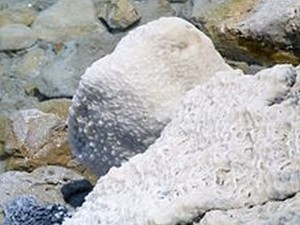“Entities such as Human Rights Watch, B’tselem, and various UN bodies have also contributed to increased demand for salt, and the industry has been more than happy to provide.”
 Kibbutz Ein Gedi, July 11 – Local officials at this community overlooking the Dead Sea have seen a marked increase in the scale and quantity of salt mining occurring in the area since Amnesty International began releasing critiques of Israel Defense Force actions in the Gaza Strip two years ago, necessitating a large intake of sodium chloride with each paragraph.
Kibbutz Ein Gedi, July 11 – Local officials at this community overlooking the Dead Sea have seen a marked increase in the scale and quantity of salt mining occurring in the area since Amnesty International began releasing critiques of Israel Defense Force actions in the Gaza Strip two years ago, necessitating a large intake of sodium chloride with each paragraph.
Ein Gedi’s principal industry is farming, but residents have also begun to seek employment of late in the salt mining enterprises that dot the shores of the lowest place on Earth, at 427 meters (1400 feet) below sea level. Those mines, which produce a mineral-rich compound unlike other types of sea or rock salt, have augmented their output by more than 200% over the last 24 months, coinciding with increased output of Amnesty International condemnations of Israeli military strikes against Hamas and its allied militias in the Gaza Strip.
Exact figures are unavailable for the last three months, but between August 2014 and March 2016, salt mine output held steady at 84 tons per month, a sharp uptick from the period preceding Operation Protective Edge, Israel’s name for the offensive to suppress rocket fire and infiltrations into Israel from the coastal territory. Average monthly salt output averaged only 40 tons per month for the two-year period prior to Protective Edge. Industry experts pointed to Amnesty’s reports as the chief factor in increased demand.
“We have the capacity to mine even greater amounts, but until now there simply hasn’t been as much demand in the market, so production has been lower, historically,” explained Koreh Zaltsman of Melakh Haaretz Industries. “But that was before Amnesty began to churn out tendentious half-truths about IDF targets. Once word got out that each of their denunciations of Israeli ‘disproportionate force’ has to be taken with a large grain of salt, our orders skyrocketed and have stayed up, mostly because Amnesty continues to parrot their previous assertions even after they were thoroughly debunked by people who bothered to look at the available evidence.”
Amnesty has been the leading factor in the salt mining increase, but not the only one, says Taa Sia of the Dead Sea Basin Regional Council Chamber of Commerce. “To a lesser but recognizable extent, entities such as Human Rights Watch, B’tselem, and various UN bodies, have also contributed to increased demand for salt, and the industry has been more than happy to provide,” she said.
Sia added that the increased supply of salt has placed some of those entities in a bind. “A good number of the supporters of those organizations also advocate BDS, which means that by disseminating the anti-IDF accusations, they’re directly increasing business for Israeli salt producers. It must be so tough for them. I cry extra-salty tears in sympathy.”




